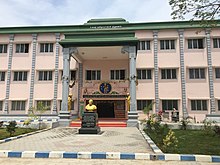International Institute of Tamil Studies
This article needs additional citations for verification. (September 2019) |
உலகத் தமிழாராய்ச்சி நிறுவனம் | |
 Facade of the new building at the International Institute of Tamil studies | |
| Motto | Yaadum Oorae; Yaavarum Kaelir |
|---|---|
Motto in English | Every town is my town; Everyone is my relative |
| Established | 1970 |
Officer in charge | Manavazhagan |
| Address | 2nd Main Road, C.I.T Campus, T.T.T.I Post, Taramani , Chennai , Tamil Nadu , 600113 , India |
| Campus | Taramani |
| Language | Tamil |
| Website | www |
The International Institute of Tamil Studies (IITS) is a linguistic research institution based in Chennai, India. It was established with a view to promoting the cause of Tamil language.
History[]
The International Institute of Tamil Studies was established in 1970 for Tamil research. In 2014, the then directors Vijayaraghavan and Manavazhagan proposed setting up a cultural center with permanent exhibition to recreate the history of Tamils unraveled by decades of research, and the government approved it in September the same year. The center was opened to the public in a new building in March 2016.[1]
Infrastructure[]
The center has a theatre, which films short eight-to-nine-minute documentaries showcasing photographs, dramatic recreations, videos, film clippings and pictures of sculptures/murals from temples. The museum is entirely based on Tamil literature. It exhibits paintings on Sangam literature, wood and cement reproductions of artefacts found in various parts of the state, photographs of collections in various other museums, replicas of weapons and implements, and replicas of ancient towns and temples. There are also dioramic representations that speak about how kings observed the rules of war, treated subjects rendering justice, and ensured fair-play and compassion to all creatures.[1]
The exhibits are arranged in five galleries, namely, the "Tholkappiar Arangam" displaying art forms; the "Thiruvalluvar Arangam" with exhibits of metalcraft/agriculture, education, medicine and weapons; the "Kapilar Arangam" with a collection of home tools/grinders and exhibits on temples and gods; the "Avvaiyar Arangam" with lifelike depictions of well-known events in the life of ancient kings; and the "Ilango Adigal gallery" with exhibits on shipbuilding and sail-weaving, for which ancient Tamils were well known.[1]
There are also scale-models of the cities of Madurai and Srirangam highlighting the meticulous city-planning and temple-building artistry found in these cities.[1]
See also[]
- Central Institute of Classical Tamil
References[]
- ^ Jump up to: a b c d Padmanabhan, Geeta (31 May 2016). "A trip back in time". The Hindu. Chennai: Kasturi & Sons. Retrieved 20 January 2019.
External links[]
- Tamil language
- Language education in India
- Language advocacy organizations
- Linguistic research in India
- Tamil-language education
- University of Madras
- Research institutes in Chennai
- Organisations based in Chennai
- State agencies of Tamil Nadu
- Colleges affiliated to University of Madras
- 1970 establishments in Tamil Nadu
- Research institutes established in 1970